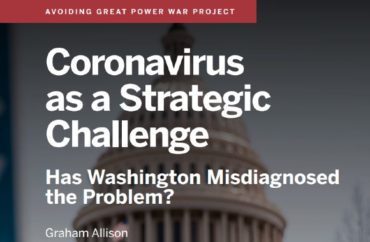
‘Begin by questioning everything’
What if the greatest threat facing the United States is not a virus from China, but the groupthink and conventional wisdom around that virus that limits our ability to respond intelligently to the threat?
A team of researchers at the Belfer Center for Science and International Affairs, part of Harvard’s Kennedy School of Government, published a recent paper questioning if the federal government had “misdiagnosed” the COVID-19 threat and is thus implementing an already failed strategy in response.
Led by Kennedy School Prof. Graham Allison and his “Avoiding Great Power War Project,” the researchers explain why the most relevant experts should be second-guessed:
[H]istory offers many cases where facing novel threats, particularly ones in which professionals failed to anticipate the threat, their best efforts to understand what hit us have misdiagnosed the challenge—with tragic consequences.
Belfer researchers have been collecting and analyzing “all the data we have been able to find about coronavirus” and “debating competing answers to the fundamental questions about the challenge this novel virus poses to our nation.”
Public health professionals and the medical community “may have fundamentally misdiagnosed the challenge coronavirus poses to our society,” Allison writes:
In the language of the U.S. intelligence community, we need a “Team B” competitor that is prepared to begin by questioning everything, beginning with the data our current collection process has produced as the starting point for the current diagnosis. If because of constraints on the number of tests we are able to conduct, testing has been rationed to those whose symptoms suggest they are infected, what would one expect? The fact that as the number of tests conducted daily has crept up, this process has found an increasing number of positives would surely not be a surprise.
Allison’s team has issued “five provocative propositions” intended to spur others to “disagree, offer additional data, and provide a deeper analysis,” starting with the novel coronavirus’s apparent mildness to young people and high risk to people over 65, along with its preference for males.
The research team also questions the “selective evidence” that coronavirus is “prejudiced against African-Americans,” and notes that data so far show “a large difference between risks of death from coronavirus for those with and without” preexisting medical conditions.
“To repeat, our purpose is not to settle any of these issues, but to demonstrate the urgent need for a much wider debate that will include experts from domains beyond those currently dominating the discussion,” Allison writes:
If in national security policy, as the saying goes, war is too important to just be left to the generals, so too in the current declared “war on coronavirus.”
Read the paper. (An HTML version is also available.)
IMAGE: Belfer Center, Harvard Kennedy School
Like The College Fix on Facebook / Follow us on Twitter




Add to the Discussion